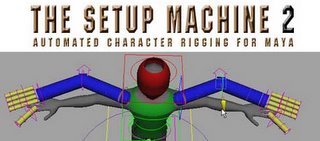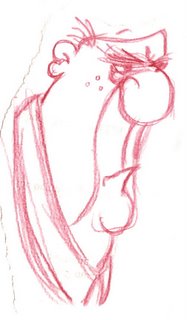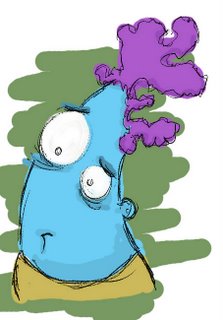What if you stink as an actor? What if you've tried acting out your scenes on video and have ended up with absolute junk?
The craft of acting is about using your own body as the puppet for the camera. So acting classes and exercises are mostly about how to manipulate your mind/emotion/body into a reflexive response that is sincere so that what shows up on the camera is a genuine human reaction. You are the puppet, therefore you must manipulate yourself. The more that you can conjure up a non thinking reflexive response to a pretend moment, the better you are as an actor. The acting classes I've taken all orbit around this idea.
Animation is acting by proxy. We don't even say the lines of audio. We are greatly limited in our ability to define a role and the moments of a story are already defined for us in many ways. We are not the puppet, so acting exercises have a somewhat limited application to an animator. The one place where these tools come in handy is if we head off to an acting room and act out a scene in front of a video camera in order to help us see how we'd play the scene if we were the actor. Lots of folks are big proponents of this in helping you get better acting in your animation. It's certainly very helpful. That is, if it's at all helpful. By that I mean this: what if you're not a good actor and you know it?
Live action reference is an old tool. In years past at Disney less popular (and presumably less talented) actors were brought in to act out a scene for the animators to study. And the animators used that reference to one degree or another. Interestingly Milt Kahl decried the "lazy bastards" who just copied the performance off the photostats. He said you get "third rate acting from a third rate actor". Apparently Milt felt there was something more needed. Even so, third rate actors are still better actors than I am. With the advent of digital video many animators have taken great advantage of acting a scene out. There's been a push to get animators to become more like actors, in the real sense of having the animator act out their scenes in order to better tap into the emotion of the moment. Then they go back to their desk and study the tape for the golden nuggets that lie within. This is helpful, I'm sure. That is if you can get anything off the tape that's real and worth using.
There's a reason I'm an animator and not an actor. An honest man must know his limits and I know that as an actor I'm not all that good. I go to the acting room, run the video and what I have after 30 minutes is pretty much crap. I guess what I'm trying to say is: me acting it out in front of a video camera in a room alone is clearly not enough for me to succeed with a scene. And even if the 9 old men were inclined to act out a scene, there was no way to record it so they could study it later, so obviously they must have done something else. Does anybody who's ever worked with the modern greats like Glen Keane, James Baxter, Nick Park or Andres Dejas know if they go into an acting room to act out their scene in front of a camera? I've never read anything that indicates that is what these guys do. So how do they get such consistently amazing performances? There must be more than video tape at work there.
I turned to the
Acting and Emotion chapter in
The Illusion of Life for help. Here's something that really surprised me...
Usually this feeling of warmth cannot be structured in the Story Dept. and must depend entirely upon the animator for its portrayal, but it remains a very mercurial sensation. A note cannot be pinned to the storyboard saying "Get warmth through here", nor can it be written as an action on the exposure sheet, "Animate 3 feet of warmth". It cannot be analyzed, or acted out or represented in the same way as an expression or a passing thought, since it is more of a sentiment that grows within the viewer from the special way the business has been animated; actually it grows from the sensitivity of the animator who makes the drawings."
pg 491Isn't it something to read that Frank Thomas (or Ollie, whoever wrote those words) said that developing that warmth in a character couldn't be acted out? Instead they indicate that there's something else going on- sensitivity of the animator. In another place they talk about the feelings the animator has for their drawings. You must have feelings
for your character, your 'drawings'. The implication was that the very act of drawing was a cathartic moment for an animator. It's that word:
sensitivity- that's what intrigues me.
How sensitive are you? Do you notice things? Are you a keen observer of people and how they behave? Are you moved when another person hurts? Do you rejoice when others succeed? Do emotional moments effect you deeply? Can you easily understand and tap into why another person would feel a certain way? Can you come alongside another person in their life and connect on a deep level with what's going on inside of them? Even if you do nothing with it, does it touch something inside of you? I know some really good animators and the best ones always seem to have this attribute, sensitivity. They're expert observers of people and their emotional states. They connect easily to others and their moments in life. Sad movies devastate them. Violent movies effect them. Real life tragedies touch them. They're sensitive people. I think in a significant sense that animation is about coming alongside of our characters in their moments and being sensitive enough to connect with them there, to be faithful in moving them in a way that is consistent with their emotions in the moment, not by shoehorning my own emotions and gestures onto them.
I realize that there are some very prominent advocates of the "acting it out in video" approach. I certainly can't argue with their success. Definitely if you're a halfway decent actor then you should by all means utilize that talent in such a way. Far be it from me to say that acting it out isn't good or helpful. I'm not saying that at all, so don't even go there. What I am saying is that for those of us who can't act (and have tried and know it) I think sensitivity is the key to getting to that point in our animation where we can be honest to our characters.









